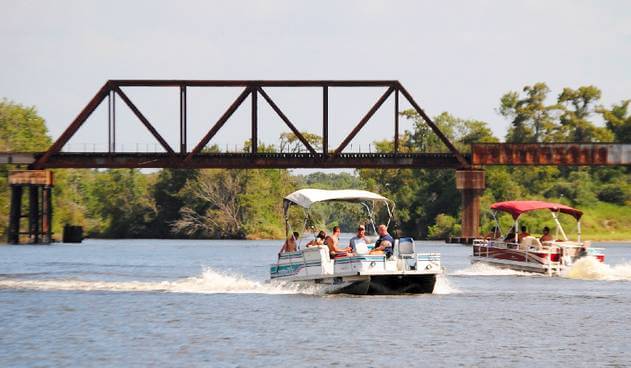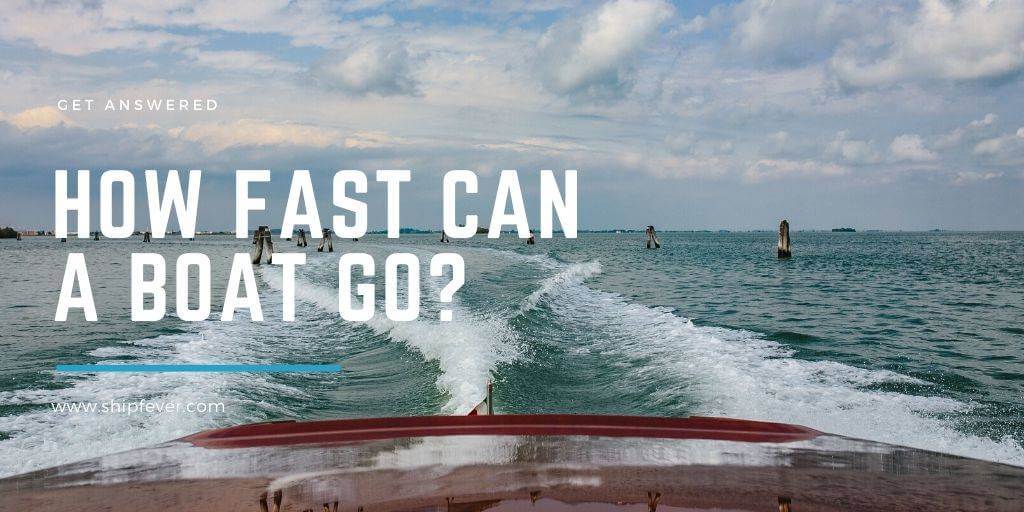Last Updated on June 6, 2020 by Amit Abhishek
How fast can a boat go? This is one question everyone has who is anyway related to boats or marine in general. The Guinness Book of Records for the fastest boat is 275.97 knots by Ken Warby in Australia.
When it comes to boating, many think of a leisure sport paddling a kayak, dingy or canoe. While some think of recreational boat party or family time on a pontoon, yacht or a houseboat.
But for a few boating is not something to move at a leisurely pace; rather how fast you can take your boat without accidents. It is for them it matters the most; just how fast can a boat go? especially their own.
When you are asked to think of going fast, people generally think of cars, bikes, airplanes or some times trains. But a boat too can go fast; in fact, the fastest boat record is 275.97 knots or 510km/hr.
The maximum speed of a boat depends on its size, type, engine power ( horsepower ), design consideration and weight.
For example, the maximum speed of cargo ships ( although not a boat ) is 24 knots or 44 km/hr. Similarly, the maximum speed for a typical pontoon is 36 knots or 41 mph i.e 65 km/hr.
Beyond that, they become highly unstable and risky to operate. But the world’s fastest pontoon boat goes as far as 99 knots or 114 mph. It was a 25-foot triple pontoon with three Mercury Pro Max 300x engines.
Although they are not always pushed to their limits. The optimal speed for a pontoon is 22 mph or 19 knots i.e 35 km/hr.
Maximum Boat Speed For Typical Boat Types
S.no | Boat Type | Average Speed of That Boat | Maximum Speed | Record Speed |
1 | A Fishing Boat Or Trawler | 09 knots or 10 mph | 20 Knots or 23 mph | 27 knots or 31 mph |
2 | Tug Boats | 13 knots or 15 mph | 19 knots or 21 mph | N/A |
3 | Deck Boats | 30 Knots or 34 mph | 50 Knots or 57 mph | 70 Knots or 80 mph |
4 | A Dingy or Dinghies | 06 Knots or 7 mph | 25 knots or 28 mph | 36 knots or 41 mph |
5 | Life Boats | 06 Knots or 7 mph | 30 knots or 34 mph | 60 knots or 69 mph |
6 | A Sail Boat | 07 Knots or 8 mph | 15 knots or 17 mph | 68 knots or 78 mph |
7 | Cuddy Cabin Boats | 18 knots or 20 mph | 43 knots or 50mph | 77 knots 88 mph |
8 | Pontoon Boats | 19 knots or 22 mph | 36 knots or 41 mph | 99 knots or 114 mph |
9 | Ferry Boat | 17 knots or 20 mph | 28 knots or 32 mph | 58 knots or 66 mph |
10 | Houseboat | 4 Knots or 5 mph | 10 knots or 12 mph | N/A |
11 | A Yacht | 15 knots or 17 mph | 57 knots or 66 mph | 70 knots or 80 mph |
12 | Center Console Boat | 30 Knots or 34 mph | 56 knots or 64 mph | 90 knots or 104-mph |
13 | Ski Boats | 16mph or 18 mph | 31 knots or 36 mph | N/A |
14 | Runabout Boats | 25 knots or 28 mph | 52 knots or 60 mph | 70 knots or 80 mph |
15 | Game Boat | 12 knots or 14 mph | 25 knots 28 mph | 48 knots or 55 mph |
How Do You Calculate The Average Speed Of A Boat?
Having the fastest boat doesn’t mean you always go for that 275.97 knots record. In fact, all motorboats are designed with speed as one of the key parameters to meet.
Even that we enjoy to go a bit faster than usual boats go; for the most part, we try to play safe.
Maybe that is why for the most time different boats run at their optimum speed. This sometimes referred to as the average speed for that vessel. For example, the average speed for pontoons is 22 mph.
This can be calculated by following the Crouch’s Planing Speed formula followed by practical observation. The speed formula gives us information about the hull speed.
This is the speed up to which waves generated by boats or ships; does not restrict its movement or simply limit its speed. It is not that the vessel cannot cross that speed limit.
But it is the speed after which boats get less and less forward movement with the power added.
One of the most accurate and well-known methods to calculate boat speed is using GPS. Other method includes using Dopler effect or Doppler shift and correlation velocity log.
For the doppler log or correlation velocity log, the average speed of the vessel is mean of the optimal speed ( the speed at which the vessel operates most of the time ).
For example, even if your boat max cruise speed was 40 mph but for the most time, it operates between 18 to 24 mph. Its average speed will be 21 mph { (18+24)/2 = 21 }.
Is 30 Knots Fast For A Boat?
Going fast in a boat can be great fun especially when you are with your friends or just competing. For average adrenaline-seeking boaters, it is a huge plus as it brings both thrill and enjoyment.
They try to take their boat to their maximum limits; many a time ignoring the stability or safety issues. But some want to play it safe while still love the adrenaline rush that comes with speed.
So, it is obvious to ask whether 30 knots is fast for my boat? Whether it’s still slow, fast or in between; you should know is it still safe and economical for your boat type.
For most boats especially those built for speed; they can easily surpass 30 knots under the right conditions.
For example deck boats, pontoon, center console boats, Runabout Boats can run at 30 knots for a longer period of time without any negative impact on its stability or its efficiency.
On the other hand for boats such as a trawler, tug, dingy, sailboats and ski boats the speed of 30 knots is too fast, unsafe and uneconomical. But boats such as yacht and ferry it’s fast, safe but uneconomical.
So it depends on whether 30 knot is fast for your boat or it’s just average speed. But if you’re talking about average speed for different boats; yes 30 knot is fast enough to give the thrill.

How Fast Will A 200 hp Pontoon Go?
You will be surprised to know pontoons are sufficiently fast to be used for most water sports. Whether its Speed Tubing, Wakeboarding or Water ski a typical pontoon boat is capable of its function.
A typical 26 feet pontoon with 200 hp motor easily reach speeds up to 40 mph. Even under full load conditions, you can go to 30 mph. From my experience, the optimum speed for water sports is 15 to 35 mph.
So your pontoon might be a little slow but will be just fine for any water sports you like to do.
While adding an additional motor or upgrading to a higher power helps. It is the load that restricts overall speed. In a study, it is been said that for every 1000 pounds your pontoon speed is limited by 12-15%.
If you are looking to upgrade your boat motor I suggest you follow this thumb rule; you need to double the power for the speed increased. For example, if you need to double your current speed just quadruple your boat power.
I find this rule back in 2016 reading on different forums. So it’s not scientifically proven but gives a rough estimate; that I find on three occasions quite close to what reality.
The other way to increase your pontoon speed by adding another pontoon/tube in between; thus converting it to a tritoon. Let’s look at the pontoon boat speed chart for some well-known pontoon brands.
Pontoon Speed Chart
Brand Name | Pontoon length | Horsepower | Speed |
Bass Buddy | 18 feet | 60 hp | 18 mph |
Gigantic | 30 feet | 115 hp | 22 mph |
Party Barge | 18 feet | 75 hp | 24 mph |
Sweetwater | 24 feet | 90 hp | 20 mph |
Sweetwater | 24 feet | 115 hp | 24 mph |
Tritoon | 21 feet | 90 hp | 26 mph |
Tritoon | 26 feet | 175 hp | 36 mph |
Suntracker | 21 feet | 70 hp | 21 mph |
Starcraft | 20 feet | 90 hp | 22 mph |
Crest 3 / III | 26 feet | 90 hp | 28 mph |
What Happens If The Speed Is Too High?
If you are like me who likes to go for recreational boating or at least been on a boat in a lifetime. Then you must know a boat is somewhat unstable at rest, but it gains stability as it starts to move.
But do you know your boat can be highly unstable if the speed is too high?
Traditionally stability of a boat or ship is calculated at rest. Which is generally affected by factors such as; free surface, displacement mass, metacentric height, heel, trim, sea condition, etc.
But since ships and boats constantly move its hydrostatic and hydrodynamic characteristics; undergoes significant change with changing center of buoyancy, underwater volume, and pressure distribution.
For a boat or ship, the restoring moment varies with change in speed. Initially, it increases with the increase in speed; then the rate of change decrease and came to a fixed point.
From there on increase in speed has a negative impact on the restoring moment and the vessel becomes more and more unstable with increasing speed.
There is also a change in linear and nonlinear roller damping coefficient. That too affects the ship’s stability as the speed becomes too high.
In other words, vessel stability increase with an increase in speed to a point. Then it stays comparatively constant for some time and decreases with a further increase in speed.
If you do not believe what I say you can see this youtube video and judge on yourself; how too much speed can be sometimes dangerous for yourself and others on board.
Also Read:
- 8 Differences Between Boat And A Ship | Boat vs Ship
- What Are Different Boat Types? | A Guide On Types Of Boats
- What Is The Best Way To Avoid Overloading Your Boat?
- Average Pontoon Boat Weight (With 51 Examples)

